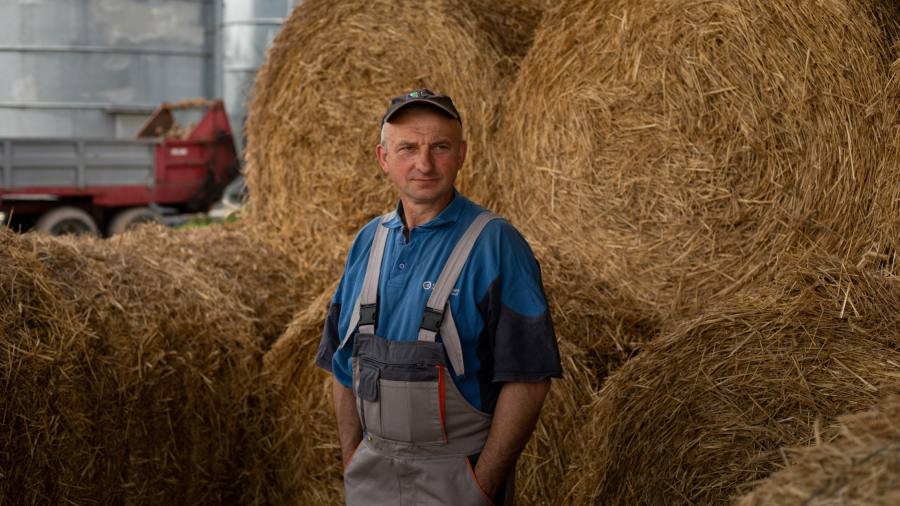After Russia launched its full-scale invasion of Ukraine, Poland backed suspending tariffs on imports from its war-torn neighbour to help get crucial food commodities out to the world.
But this year Warsaw reversed course, imposing a unilateral ban on some Ukrainian foodstuffs that pushed the EU into curbing grain imports from the country last month.
The reason for the about-turn: farmers such as Sławomir Wójcicki, who estimated that he had lost about 250,000 zlotys (€55,000) when he was forced to sell his grain at below production costs in order to empty silos before the next harvest.
“I feel our minister lied to us about what would happen to prices,” said Wójcicki, who also grows strawberries in the municipality of Garbatka-Letnisko in central Poland.
Farmers have traditionally been a cornerstone of the ruling Law and Justice party’s (PiS) electorate, but they have increasingly turned against the rightwing government ahead of parliamentary elections this autumn, which look set to be closely fought.
This has boosted smaller parties that promote farmers’ concerns after cheaper Ukrainian grain flooded the local market, driving many into losses. Some blockaded roads with tractors in protest against what they said was a threat to their livelihoods. PiS is now seeking to win back their support.
But Wójcicki still has concerns. “I’m worried about what will happen next with the fruit harvest and Ukrainian strawberries.”
The grain glut formed after the EU lifted tariffs on Ukrainian grain last year in a bid to facilitate Kyiv’s access to global markets via Poland and other land routes. That followed Russia blockading Ukraine’s Black Sea ports as part of its all-out attack.
Warsaw, one of the main proponents of removing tariffs, faced a stiff backlash from Polish farmers and then imposed its own ban, a rare move against war-torn Ukraine by one of its staunchest EU allies.
In late April, Poland and three other EU states lifted their unilateral bans after reaching a deal with Brussels to allow Ukrainian cereal imports to enter the bloc only if they were guaranteed to transit to Africa and other destinations.
Brussels also offered €100mn from EU funds to compensate farmers and agreed to a Polish-led demand to investigate the impact of Ukrainian exports of other agricultural products — from poultry to milk — to see whether more curbs were needed.
But the domestic electoral consequences are still to play out. “Ukrainian grain has absolutely put the focus on the farming vote,” said Konrad Szymański, a former European affairs minister in the PiS-led government who now works for the Polish Economic Institute, a think-tank.
“It’s been very important for PiS to keep that vote,” he said, noting that appealing to rural voters was a main strategy of PiS leader Jarosław Kaczyński since 2005, when his party first came to power.
PiS still retains the largest share of countryside votes, according to the latest opinion polls. But in a tight election race, the fragmentation of the rural electorate could also undermine the party’s ability to steer post-election coalition negotiations.
One possible beneficiary is the rightwing Konfederacja party. Its agenda combines traditional family values with an economic liberalism that has become more aligned with a countryside that “has changed so much that some farmers have become entrepreneurs managing huge farms”, said Ewa Marciniak, a political-science professor.
The Agrounia farming association that organised recent protests is also now campaigning as a newly registered party. Agrounia’s leader, Michał Kołodziejczak, said the grain crisis showed that farmers needed a direct say in politics.
“PiS are false defenders of the Polish countryside,” Kołodziejczak said. “I hope farmers will see they need real representatives in the Sejm”, the lower house of parliament.
But Marciniak expects newcomers to make limited gains in the election, given that PiS is now responding to farmers’ demands. Last month the government also replaced its unpopular agriculture minister Henryk Kowalczyk, who resigned after being pelted with eggs by farmers. Kowalczyk blamed Brussels for the grain fiasco.
Two weeks later Prime Minister Mateusz Morawiecki announced an aid package worth 10bn zlotys that combines subsidies with tax rebates and that he called “the biggest aid for farmers on record”.
In the village of Sieciechów, PiS mayor Arkadiusz Guba, himself a farmer, has also borne the brunt of public anger. “People might not remember 100 past successes but they will remember one failure,” Guba said. “The big corporate [trading] intermediaries, most of them Polish, are the only winners [in the grain crisis]”.
Some politicians in the ruling coalition now acknowledge Poland mishandled the lifting of tariffs.
“The issue was not governed properly at the very beginning,” said lawmaker Jadwiga Emilewicz, who was appointed this month by the government to oversee Polish-Ukrainian development co-operation.
“One misleading idea was to tell [farmers] they shouldn’t sell their grain because the price was going to be higher at the end of the year, which wasn’t true.”
She suggested PiS could form a coalition with the new groupings seeking to represent farmers ahead of elections.
“We have been losing some votes, but to new parties. If you think about the calculations for the future parliament, it would be much tougher for us if these [votes] went to the opposition” led by former premier Donald Tusk’s Civic Platform party.
Marcin Gryn, deputy leader of the Polish association of grain producers, said many farmers had lost faith in PiS but did not know who else to support.
“We as farmers have no one to vote for because we know that it would not be better under another government.”
Read the full article here




